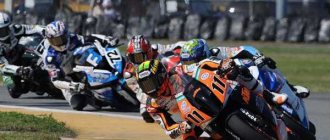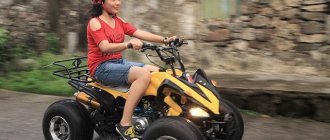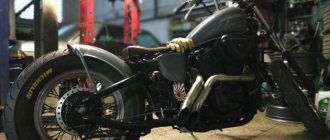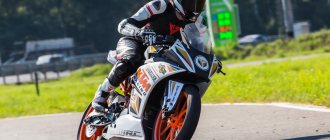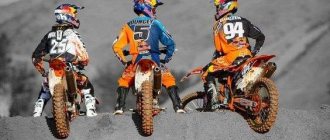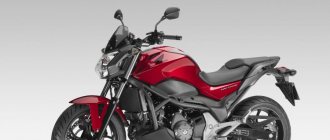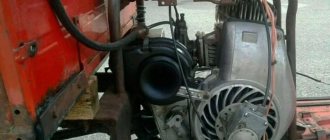Anyone who has ever been to a motocross competition has seen how spectacularly the motorcyclists on their “iron dragons” take corners. Admiring spectators often wonder: is the rider driving the motorcycle or is the motorcycle carrying the rider? In this sport, success equally depends on the skill of the driver, his skills, experience, and the technical characteristics of the vehicle. Only by merging with the motorcycle can an athlete control it, and not everyone can do this. Repeated training develops motor reflexes, which are gradually brought to automaticity.
Motocross
One of the main types of motorcycling. Competitions are held on specially prepared circular tracks with natural or artificial obstacles, mainly steep climbs, descents and turns, as well as ditches, sandy areas and others.
Due to the complexity of the track, special motocross motorcycles are used to participate in the races. They are distinguished by a lightweight frame, large suspension travel (300 mm), and the absence of headlights and a dashboard. Some models also lack an electric starter.
Motocross competitions are further divided into subtypes:
- Classic - the length of the track is limited to 1.5-3 km, and the maximum speed of the racers is 50 km/h.
- Supercross is held on a ring track outdoors or indoors, but with a mandatory natural surface. In the first case, the minimum length of the route is 400 m, in the second – 300 m.
Famous Russian motorcyclists
The winner of the first crew race was P. N. Belyaev, an honorary citizen of St. Petersburg. He was a participant and organizer of many subsequent competitions in this area, one of the founders of the Russian Automobile Society.
Stalin's son, Vasily, became the patron of domestic motorsports. He initiated the production of motorcycle equipment and encouraged citizens to attend competitions without fail.
People far from politics also contributed to the history of the development of motorsports in the USSR. Some of them are the Buchin brothers, the sons of an auto mechanic. Alexander and Sergey are masters of sports, record holders and winners of many competitions. V. Korneev is a multiple champion of the USSR and an honored coach of the national team. E. Kosmatov is a two-time winner of international FIM competitions.
The history of motorsports includes many outstanding women. Among domestic athletes, it is worth noting I. Vladimirova, who set an all-Union record for completing the distance at the USSR championship in 1937. A. I. Ozolina is a multiple champion of the USSR, a prize-winner of international competitions, and coach of CSKA.
Speedway
The speedway takes its name from the English word meaning “highway”, “highway”. In Russian, the name “track disciplines” is also used for it.
The speedway track has an elliptical shape and necessarily contains 2 straight sections and 2 left turns. The total length of the route is 260-400 m. It does not contain artificial or special obstacles or turns.
The surface of the track can have different coatings, according to which subtypes of speedway are distinguished:
- cinder,
- earthen,
- herbal,
- icy.
A special feature is grossspeedway – motorcycle racing on a long track. The key differences from the classic competition are the longer track duration (about 1000 m), higher speeds, 6 simultaneously participating riders instead of 4 and minor changes in the design of the motorcycle.
Road racing
Unlike the above-mentioned varieties, the route for road-ring motorcycle racing has a high-quality asphalt surface and a relatively long length (from 3 km), since it involves passing at high speeds. Its shape is a curve with a lot of left and right turns.
Races are divided into subtypes depending on the motorcycles used:
- MotoGP are special 2 or 4 cylinder non-production sports motorcycles weighing more than 137 kg and with a maximum engine capacity of 990 cm3.
- Superbike are machines based on mass-produced models.
Also specially distinguished are road-circuit endurance races, during which athletes from one team replace each other.
Motorcycle customization
Setting up a motorcycle for freestyle motocross is a purely individual matter; each athlete must customize it, first of all, for himself. But some general points related to the engine, suspension, grips and comfort during the jump should still be taken into account.
Choosing a motorcycle
Motorcycles for freestyle motocross are used. And then the riders themselves modify the bikes to lighten their weight and improve performance. A minimum of plastic, large spoked wheels, a hard seat and a long-travel rigid suspension are the distinctive features of this motorcycle. The most famous manufacturers of motocross motorcycles are Honda, Kawasaki, KTM, Suzuki, Yamaha. The weight of such a motorcycle is about 100 kilograms, the optimal is 90–95 kg. One of the most titled freestyle motocross riders, Puerto Rican Travis Pastrana, who first performed a double somersault in competition and is considered the founder of freestyle motocross, always rides Suzuki motorcycles. The average motocross bike costs approximately 5,500 euros. The final price of the motorcycle will depend on the number of improvements made.
Engine
The best freestyle engine is a 250cc two-stroke. see. The carburetor must immediately be adjusted so that the engine is not loaded upon landing. It is better to adjust the maximum power output at high speeds for training in natural flights; if you have to jump in the park with short accelerations, then it is better to adjust the output at medium and low speeds. Special resonators and a larger rear sprocket will help cope with this situation.
Suspension
A special suspension is used for a softer landing. You can configure the existing one for the so-called slow style (relative to the rebound speed) or supercross according to the rider’s weight. For long jumps you will need to add more stiffness at the end of the suspension travel.
Comfort and grip
A slightly raised handlebar without a crossbar is used to freely make acrobatic movements above it, so there is more room for legs and arms. Lowering the seat (cutout) also serves the same purpose, making it easier to move your leg when performing tricks. The wings are trimmed for ease of performing various acrobatic elements. To make the grips, you need to make cutouts in the side panels. Handles just above the handlebars and above the rear fender are also popular modifications.
Enduro
Enduro differs from all other types, first of all, in the complexity of the path, due to a large number of obstacles and deliberately difficult road conditions, up to complete off-road conditions. Competitions in this sport can be held both in open areas (a closed track 15-60 km long) and in stadiums with an earthen or sandy road surface and the presence of natural obstacles - mud, puddles, stones, logs.
Separately, it is worth noting the oldest type of competition - the “six-day race”, which included sections with special tests: high-speed sections, uphill races, cross-country races and others. Such special sections are interspersed with sections of public roads along which motorcyclists move in compliance with traffic rules.
Participants use special motorcycles, in the design of which greater attention is paid to reliability, lightness and engine traction, which is higher than the maximum developed speed.
Enduro is one of the most diverse types of motorcycle sports, as it includes a large number of subspecies:
- Cross-country is almost a complete analogue of the “classic” enduro, but has one important difference - they consist exclusively of special stages.
- Rallies are multi-day races. The simplest example is the Parid-Dakar rally.
- Endurocross – complements the classic track with elements of a motorcycle trial. It is carried out in a stadium where, in addition to natural obstacles, artificial obstacles are also installed, for example, the wheels of large cars.
- Extremeenduro – racing on particularly difficult trails.
- Enduro sprint is one special race on a track that does not include public roads. Participants begin completing the circle one by one with a 20-30 second delay. The start of the next lap (their total number is 7-8) occurs after all riders have arrived at the finish line.
Other types of motorcycling
All of the above disciplines are included in the All-Russian Register of Sports, but there are other varieties in which competitions are also held:
- Road racing is a competition on road motorcycles on an open paved road.
- Freestyle motocross is long jumping on motocross motorcycles, performing acrobatic stunts in flight.
- Stuntriding is stunt riding.
- Figured driving is maneuvering on a flat area with markings and artificial obstacles on it.
- Minimoto – competitions on minimotorcycles.
These are not all, but perhaps the most important and famous types of motorcycle sports. For most of them, competitions of various, including global, scales are regularly held.
History of motorcycle racing
Motorcycle racing began and became popular at a time when motorcycles were just being introduced.
The first cars that were designed for riding appeared at the end of the nineteenth century and were not popular among the population. To prove the advantages of this technology, a competition such as motorcycle racing appeared. In France, the Automobile Club was created, which organized the very first motorcycle races in Paris at the end of the nineteenth century. And after this, this country is considered the center of the world sport of motorcycle racing. It was a rally of all types of cars along an ordinary road over a long distance. All types of motorcycles, even three- and four-wheelers, were allowed to compete.
The crew of the car could tow their vehicle or repair it during the competition. The main requirement was to reach the finish line under our own power. At the beginning of the twentieth century, auto racing and motorcycle racing were officially separated as separate types of competition. MFMC was formed in 1904. And now only this organization held international motorcycle racing.
Competitions held on the road were not interesting to spectators, but they needed to be attracted. To get people interested in racing, competitions began to be held on motorcycle tracks that were created specifically for racing. Each time the competition conditions became more complicated and new tests were added for motorcyclists.
Road racing, which was called road racing, was transformed into another type, road-ring, and it became more spectacular. New requirements and conditions have appeared. It was necessary to climb a hill on a motorcycle, and races were held at record speeds. Speed races are held on special tracks. Racing conditions changed, and, accordingly, new motorcycle designs appeared.
Off-road motorcycle racing also appeared at the beginning of the last century. For the first time, such competitions were held in London. Gradually becoming more and more popular, motorcycle racing began to take place in the form of entertainment shows.
Russia held such competitions for the first time in 1898. This happened near the city of St. Petersburg. And after that, motorcycle races on the Moscow-St. Petersburg road were held constantly. The former Soviet Union also began to hold similar motorcycle races. This happened in 1924. They went to the hippodrome. And when the domestic motor industry began to develop, similar competitions were held in every republic of the Union.

